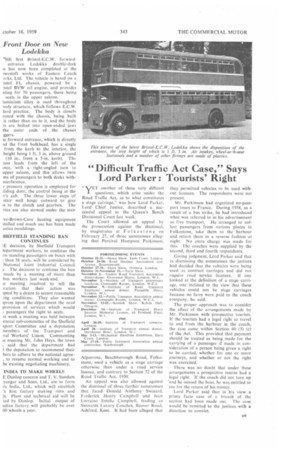"Difficult Traffic Act Case," Says
Page 43

If you've noticed an error in this article please click here to report it so we can fix it.
Lord Parker : Tourists' Right " YET another of these very difficult questions, which arise under the Road Traffic Act, as to what constitutes a stage carriage," was how Lord Parker, Lord Chief Justice, described a successful appeal in the Queen's Bench Divisional Court last week.
The Court allowed an appeal by the prosecution against the dismissal, by magistrates at Folkestone on February 27, of three summonses alleging that Percival Hampson Parkinson.
Alpenrose. Beachborough Road, Folkestone, used a vehicle as a stage carriage otherwise than under a road service licence, and contrary to Section 72 of the Road Traffic Act, 1930.
An appeal was also allowed against the dismissal or three further summonses that faced Donald Anthony Swinard, Frederick Henry Campbell and Jean Lorraine Estelle Campbell, trading as Swinards Luxury Coaches, Beaver Road, Ashford, Kent. It had been alleged that
they permitted vehicles to be used without licences. The respondents were not present.
Mr. Parkinson had organized no-passport tours to France. During 1958, as a result of a bus strike, he had introduced what was referred to in his advertisement as free transport. He arranged to collect passengers from various places in Folkestone, take them to the harbour and return them in a reverse fashion at night. No extra charge was made for this. The coaches were supplied by the second, third and fourth respondents.
Giving judgment, Lord Parker said that in dismissing the summonses the justices had decided that the vehicles were being used as contract carriages and did not require road service licences. If one looked at the definition of a stage carriage, one inclined to the view that these vehicles could not be stage carriages because no fares were paid to the coach company, he said.
The proper approach was to consider the effect of the arrangements made by Mr. Parkinson with prospective tourists. If the tourists had a legal right to travel to and from the harbour in the coach, the case came within Section 40 (3) (c) of the Act. This provided that payment should be treated as being made for the carrying of a passenger if made in consideration of a person being given a right to be carried, whether for one or more journeys, and whether or not the right was exercised_ There was no doubt that under these arrangements a prospective tourist had a legal right. If the coach did not turn up 'and he missed the boat, he was entitled to site for the return of his money.
Lord Parker said that in his view a prima facie case of a breach of the section had been made out. The case would be remitted to the justices with a direction to convict.




















































































































